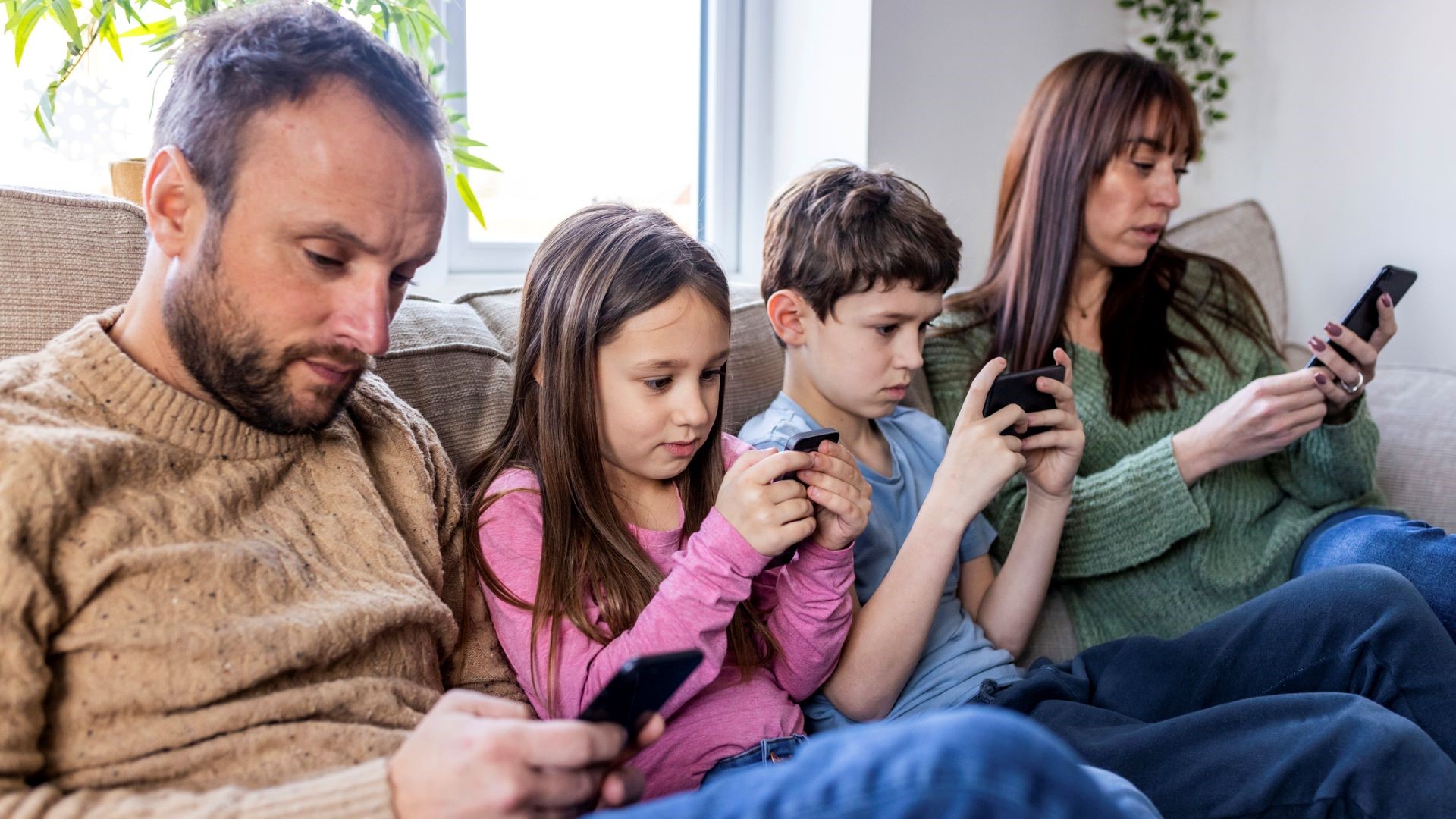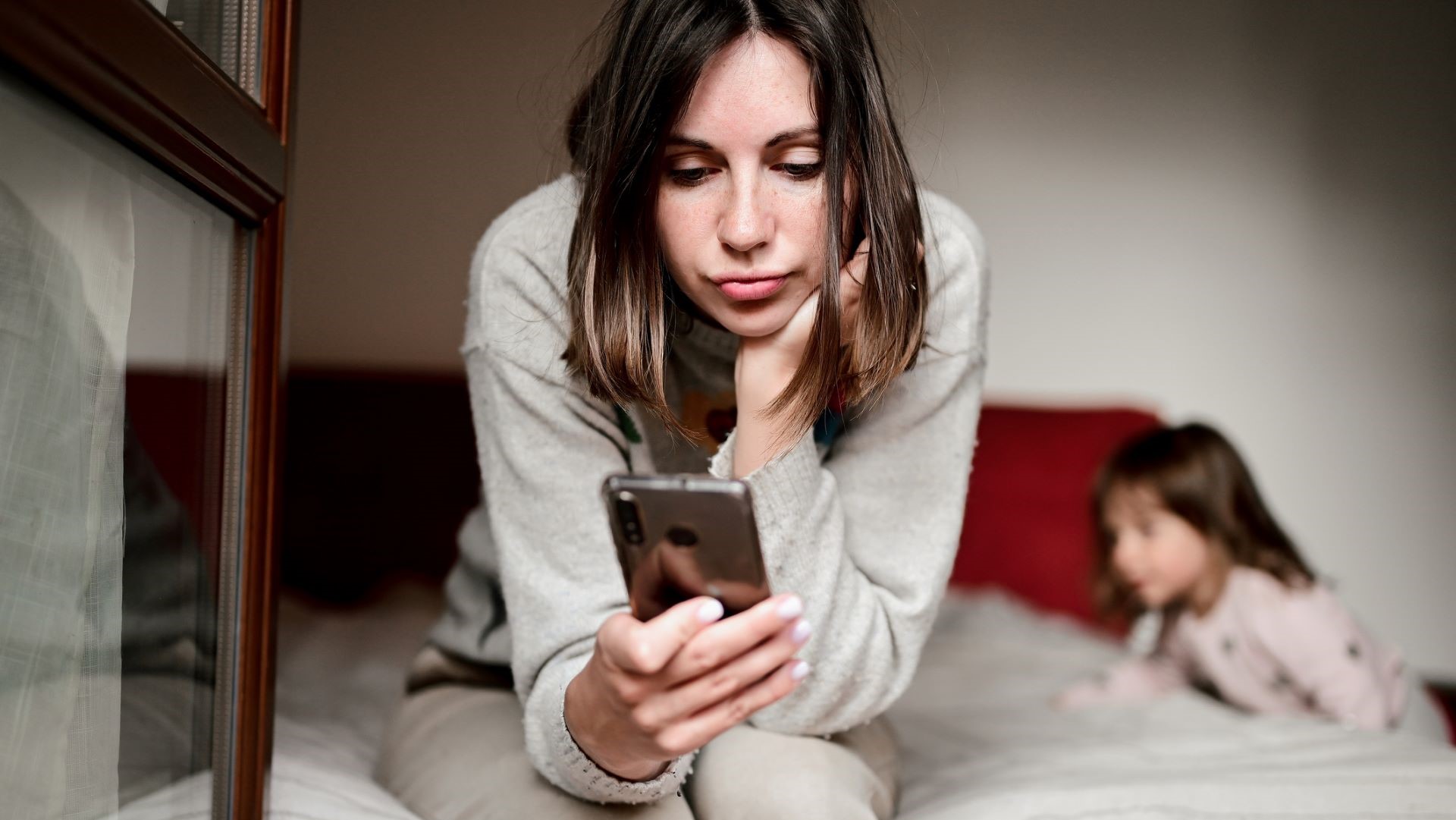Nomophobia and your family: how mobile phone addiction is really impacting life (and expert tips to make changes)
How do you know if you're addicted to your phone and what can you do about it? We've got 16 signs of phone addiction and 8 ways to quit

Endlessly scrolling on our phones could negatively impact our children’s long-term well-being. We’ve all been there and felt the guilt, so here’s how to put the phone down and get back into family life.
We’ve all fobbed our kids off while scrolling social media feeds, reaching for our phones when we hear an alert, or pretending to be ‘checking emails’ while we read the latest news headlines or do some online shopping. You’re not alone in taking a 5-minute breather - it can be good for you to step away for a break. However, research is emerging that too much mindless staring at our phones could be affecting our kids’ mental health and anxiety levels, so how can we take control of our parenting style and be more aware?
What our writer learned

"I'm definitely guilty of exhibiting many of the symptoms of phone addiction that we highlight in this article, which surprised me, as I thought I had a fairly healthy relationship compared to my friends! I'm going to try to be more mindful when I use my phone and avoid 'double screening', especially in the evenings. Plus, quite a few Whats App chats are now going on mute indefinitely..." Joanne
While phone addiction isn’t yet defined as a medical addiction, there’s a lot of research to suggest that it is becoming a problem in our day-to-day relationships, especially with our children. Technoference, phubbing, a welcome distraction from the boredom of everyday parenting - whatever you want to call it - phone addiction is a thing, and studies are starting to link it to behavioural problems in our children. “Most adults use their phones daily, and many do not realise the potential impacts it can have on the family, specifically children,” says addiction psychiatrist Dr Alexander Lapa. “Social media, in particular, is a common cause of frequent phone use and addiction.”
We dig into the research behind phone addiction, talk to the experts about being more present in family life, and discover practical ways to put down your phone.
How does phone addiction affect families?
Smartphone addiction affects families in so many ways and if anything the grown-ups using their phones so much is perpetuating kids using them more. So it's no surprise that phone addiction is a growing problem across the globe. While there isn’t enough research to tell us about addiction rates in the UK, studies in Saudi Arabia and China have found addiction rates to be as high as 40%.
More recently, researchers have been investigating how phone usage affects family relationships. One study on hundreds of children examined how 'phubbing' (ignoring your child in favour of your phone) affected parent-child relationships. It found that phubbing made kids feel neglected and rejected and caused teens to use their phones more as a coping mechanism, continuing the cycle of phone addiction.
A US study into 'technoference’ (a smartphone or other tech device interrupting a conversation or activity with your kids) found that almost half of parents experienced technoference at least three times a day. Parents found that these interruptions were more likely to result in behavioural problems in their kids, for example, acting up, whining or sulking, having temper tantrums or being easily frustrated by tasks.
Parenting advice, hot topics, best buys and family finance tips delivered straight to your inbox.

“Children can pick up bad habits from behaviours they witness, and frequent phone use can influence the way children treat technology and their general behaviour,” says Dr Lapa. “If a parent has a phone addiction, children may resort to bad behaviour or behave erratically in order to grab a parent’s attention. Children may also develop poor social skills and struggle to maintain eye contact or concentrate for long periods of time as a result of a parent’s phone addiction.”
It’s not just families who are affected. The addictive use of smartphones more generally has been linked with mental disorders like bipolar disorder, depression, anxiety, and personality disorders.
It’s not all doom and gloom, though! A Chinese study in 2023 found that close-knit families tend to be less addicted to their phones, and the stronger the bond, the less phone usage. So, understanding how to strengthen bonds within your family can help reduce how much time you spend on your phone.
Phone addiction symptoms
It’s important to stress that while the following symptoms can be signs of a phone addiction, it doesn’t mean you have one! Before you throw your phone across the room or lock it in a drawer, be kind to yourself and realise that we’ve all experienced most of these at some point or another. Just because you occasionally feel one or more of the following doesn’t mean you’re addicted. But it could help you understand your phone usage more often and how in control you really are. “Using your phone regularly may not indicate a phone addiction, but certain behaviours and excessive use can,” says Dr Lapa.
Signs you may have a phone addiction:
- Feeling bad when you can't use your phone, like if it's lost or out of battery.
- Other people have complained to you about how much you’re on your phone.
- Always thinking about your phone and checking for new messages or updates.
- Using your phone so much that it causes problems with your family or work.
- Using your phone on holidays and during family events so much that you miss key moments and memories.
- Thinking your phone is vibrating or ringing, even when it's not.
- Hiding your phone use by sneaking off to spend time on it.

- Losing a sense of time passing while you’re on your phone.
- Ignoring how much your phone use affects your life.
- Being really focused on your phone and not paying attention to other things.
- Feeling like you can't stop using your phone, even when you want to.
- You're not getting things done because you're always on your phone.
- Feeling anxious when you don't have your phone with you.
- Trying to use your phone less but not succeeding.
- Needing to use your phone more and more to feel satisfied.
- Using your phone all the time, even when you don't want to.
How to quit your phone addiction
We’ve asked our experts for their top tips on reducing phone usage. Here are 8 tried and tested ways to quit your addiction (and enjoy real life more).
1. Set usage limits
Understandably, reducing your phone use can feel daunting, especially if you're always used to having your phone with you. Start by setting small, achievable limits on your phone usage each day.
Try using an app to track your phone usage. While initial usage amounts may seem super scary (‘How on earth did I spend three hours on my phone today?!’), they will help you understand your usage patterns and make positive changes. There are even apps that can limit when you can access your phone.
Remember, it's okay to take it one step at a time and gradually decrease your screen time as you become more comfortable with the change.
2. Share with your kids what you’re doing
Kids love getting involved in a project, especially if it involves them telling you off! Why not let your child know you’re trying to reduce your usage and ask them to remind you if they see you on your phone? If they’re old enough, ask them how they feel when you ‘phub’ them in favour of your phone. It could be the eye-opener you need to start cutting back.
3. Be mindful when you’re using it
Being mindful of your phone usage doesn't mean beating yourself up over it. It's about observing your habits without judgement and understanding why you turn to your phone in certain situations.
“From a psychotherapy perspective, phone addiction - like other addictions - represents an 'unmet need',” says counsellor Georgina Sturmer. “So we might be feeling worried or bored or depressed or lonely, and our phone offers that easy hit of 'cheap dopamine' that allows us to ignore or suppress these other feelings.”
In other words, what feelings trigger you to reach for your phone? Is it restlessness, boredom, anxiety, or stress? By practising mindfulness, you can gain insight into your behaviours and develop healthier ways to cope with stress or boredom. “Think about what you might need to bring into your life in order to nourish yourself when you're feeling this way,” suggests Sturmer.
Sturmer also suggests avoiding ‘double screening’ to be more mindful in the moment. “If you're watching TV, or working on your computer, try to stay focused on what you're doing. Double screening is a habit we often subconsciously copy from those around us.”
4. Create phone-free zones or have a digital detox
Designating certain areas or times as phone-free zones can create boundaries between you and your device. This doesn't mean you have to disconnect from the world completely; it allows you to be more present in the moment and fully engage with your surroundings. For example, have a no phones at the table rule, switch off at 9 pm, or don’t take your phone to bed.
Taking breaks from your phone, even for short periods, can rejuvenate your mind and body. Remember to prioritise self-care and permit yourself to disconnect. Even if you still use your phone in front of your kids, you are practising other ways to reduce dependence. Over time, this will feed into your everyday life, too.
"I bought a box to keep our phones in," mum of three, Dionne tells us. "It was a game changer and such a strong visual to the family that we are not doing this, we are physically and intentionally putting [our phones] away."
The Lockbox with timer, £38.99 from Amazon
Medicine Code Lock box (big enough for iPads too), £19.58 from Amazon
Personalised Family Time Box, £23.99 from Etsy
5. Use the technology you already have
"Most mobiles have focus mode, which on Apple devices gives you the option to mute notifications from apps during selected times of the day, which can reduce your likelihood of picking up the phone,” says Dr Lapa.
“Android have a similar feature and goes one step further by restricting access to apps you select during certain times of the day, which can be especially beneficial if social media apps are the root cause of phone addiction.”
6. Find alternatives
Different activities or hobbies that don't involve your phone can be a rewarding experience. “Goal setting is a common therapy method used to treat various addictions and finding alternative activities that do not involve a phone,” suggests Dr Lapa.
Think about activities that bring you joy or fulfilment, such as reading a book, walking, or being creative. Investing time in these activities can reduce your reliance on your phone for entertainment. Try finding activities you and your family can do together.
7. Get outside and be active
Physical exercise or outdoor activities are good for your health and can also help distract you from the urge to use your phone. Whether you go for a run, practice yoga, or just walk with the dog, find activities that make you feel good and prioritise them in your everyday routine.
8. Remove your most used apps, like social media, from the phone
If you continually reach for your phone to check Facebook, Instagram, or X, think about deleting them from the device. You can always check in on a laptop later. Mute active Whatsapp groups and conversations and check in at specific times instead of every time there’s a ping.
What to do if you think you need more help
If you think your phone addiction is significantly impacting your life and your family relationships, and you're struggling to make changes on your own, get support from a mental health professional. Cognitive behavioural therapy can help to stop compulsive behaviours while addressing feelings that cause you to reach for your phone in times of difficulty.
Our experts

Georgina Sturmer is a counsellor for a parenting charity and comments widely for the press on matters related to parenting, addiction, families and social media.

Dr Lapa is an addiction psychiatrist for Action Rehab, an advisory service for individuals suffering from drug addiction, alcohol addiction or behavioural addictions.
Get more expert advice and information on being more present with your kids, from understanding what core childhood memories are and how to shape them to how ‘slow parenting’ can improve your connection – with practical examples to try. Plus, knowing how to talk to your kid about their emotions isn’t always easy - try these 7 child-therapist-approved ways to get them talking, from asking open-ended questions to not challenging their feelings.
Joanne Lewsley is mum to a tween, and freelance copywriter and editor who creates parenting, health and lifestyle content for evidence-based websites, including BabyCentre, Live Science, Medical News Today and more.